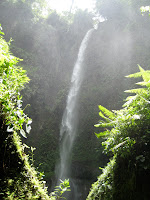After being gone two weekends in a row, I needed a restful (to use a polite term for lazy) weekend in Arusha.
I am thrilled to report that my attempts to speak Kiswahili are finally paying off (quite literally!). Hannah, Elise, and I walked to a nearby Maasai craft market on Friday where we were ambushed by vendors. The locals are accustomed to muzungu tourists only staying for a few days in Arusha and they are always pleasantly surprised when a muzungu can speak Kiswahili (or at least say more than Jambo! which is a greeting that we’ve avoided because it screams tourist). The numerous aisles of vendors quickly overwhelmed me. I spotted a group of older women making beaded jewelry under a tree nearby. As I approached, they greeted me in English and I responded in Kiswahili… (The formal greeting for elders is “Shikamoo”). I managed to hold a small and basic conversation with the women, during which I haggled for and bought three bracelets. As I was preparing to leave, the women kindly handed me four bracelets as a gift for their “muzungu friend.”
The freebies didn’t end there! Karla and I went on a 30-minute walk to a market that we had walked by several times. After perusing the merchandise (and in this case the merchandise was a plethora of avocadoes, bananas, carrots, broccoli, tomatoes, mangos, etc) I struck up a conversation in Kiswahili with an older woman. I bought a few avocadoes from her and then continued my hunt for tomatoes. As I was leaving, I heard my name being called and I looked up to see the same woman offering me three carrots at no cost. I politely and happily accepted the gift and promised to return. Whether offering freebies to muzungus is a strategic move or just a kind gesture, I cannot say. For my own purposes, I hope it’s the latter.
Even a “lazy” weekend in Arusha is never boring. After a failed attempt to study Saturday afternoon, I attended an International festival for music, dance, and food at the International School of Moshi. Our music professor encouraged us to attend because a famous group from Zanzibar would be playing traditional Taarab music, in addition to collaborations with local western musicians. As soon as I walked on to the grounds of the festival, I was in an International Studies major’s paradise. The Dutch were wearing wooden clogs on my right, the Germans were selling various beers to my left, and just around the corner, the Indians were draping people and saris and turning hands into beautiful works of art with henna. I was so over-stimulated, overjoyed, and overwhelmed that I didn’t know where to begin!
And then I saw it. The American booth. The immensely-ironic-completely-contrary-to-the-current-International-System-yet-still-rather-symbolic American booth. A piece of cloth bearing Barack Obama’s portrait was being used as a table cloth, on which a pan of hot dogs was sitting, looking vastly unappealing even to a hotdog lover like myself. No one was neither manning the booth nor attending the booth. Feeling oddly patriotic despite the pathetic display of American pride, I approached the booth. My eye was immediately drawn to a sign that read “Yes you can… Buy a hotdog!”. I laughed to myself and hoped that the foreigners at the festival know that there’s more to America than hotdogs and Barack Obama.
For being an International Festival in Tanzania, there were surprisingly few booths from the continent of Africa. I later learned that the booths were representing the countries that the students were from—most of which are either the children of UN workers or children of Safari lodge owners. I had the chance to walk around the grounds of the school for a while and it forced me to draw comparisons. I had recently taken a tour of the Arusha School where students are crammed into outdated and dilapidated classrooms. Just down the road, the classrooms at the International School were spacious, clean, and outfitted with computers, projectors, and laboratories. As I walked from classroom to classroom at the festival, I read the names of the teachers on the doors. Mrs. Wilson, Mrs. McBride, Mrs. Snow—all were clearly western names. There are very few “inbetweens” in Arusha—it is dominated by extremes. The gaps are large, often swallowing those at the bottom. It’s an ugly reality that I rarely face at Miami, but one that I literally meet face-to-face on a daily basis here.
We returned to our apartments after the music ended and were greeted with a very pleasant, fluffy, and adorable surprise…
A puppy!
Going against all study abroad advisers’ advice, we got a puppy! Her name is Jaala, which means fate in Kiswahili, and very appropriately so! Jaclynn, Ana, and Liana were driving to meet a friend in town when a tiny ball of fluff stumbled out of the bushes into their path. The puppy was undernourished, covered in bugs, and roaming around on the streets. The picked her up and found a woman who said they could have her in exchange for “soda money.” They handed her 5,000 shilling (about $4) and left. In a lucky turn of events, the friend who they were meeting had a sister who was a veterinarian and happened to be in Arusha for the weekend. They immediately went to see her and Jaala got all of her shots, an insecticide spray, and official registration as a pet. When I met Jaala for the first time, she was clearly exhausted from a long day of events, during which she went from being a street puppy to a muzungu’s puppy. Liana, who is here on a Fulbright documenting the interaction between elephants and humans, was planning on getting a puppy before she goes back to the states in December, so Jaala is the lucky puppy that gets to fill that role. In the meantime, we get to play with her and take care of her as our own.
Jaala made the week of midterm exam preparation much more enjoyable. Since we aren’t technically allowed to have Jaala at our accommodation, we would take her to ViaVia during the day where she could run (more like stumble) around. The Maasai have taken a particular liking to Jaala, and she has acquired a similar liking for them! Jaala has her own shuka that we wrap her up in, and even her collar is a beaded Maasai bracelet. Despite her African roots, Jaala has picked up American eating habits and I am convinced that her belly is twice the size as it was from when they first found her.
Besides Jaala, I’ve found a couple other ways to circumvent studying. On Friday afternoon, Roland invited us to pick-up basketball group that he coaches. For those of us who didn’t want to embarrass ourselves on the basketball court, there was a field where we could play Frisbee. Roland also brought his two kids, Radley (1) and Betsy (4). Among Radley, Betsy, and my new best friend Kelvin (6), I got the best workout I’ve had in months. Kelvin’s English was surprisingly good and we bonded immediately when he gave me his whistle to wear, and in exchange I gave him my sunglasses. I spoke to Radley and Betsy mostly in French, although they were both initially very shy. We jumped rope, kicked a soccer ball, played in dirt, and ran in circles from mid-afternoon until dusk when the basketball practice was finished. A pick-up soccer game was going on in the field next to ours and every once in a while goats would pass by, causing interference. I promised Kelvin that I’d return to play with him again soon. I gave back his whistle and he gave me back my sunglasses.




